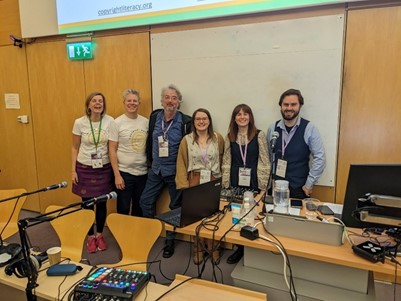I was lucky enough to be awarded a bursary by LIHNN to attend LILAC 2023 at the University of Cambridge in April. It was a fantastic three days of networking, ample canapés, and of course, lots of interesting sessions on all aspects of information literacy. Below I have summarised my personal highlights:
Accessibility – what does it mean for libraries and education? (Maria King, Keynote Speaker)
This was a really engaging keynote speech and Q&A on accessibility in libraries and education, specifically in relation to neurodivergent users. Maria is neurodivergent herself and offered some practical advice on how we adjust our teaching practices to improve the learning experience for neurodivergent learners. She advocated for taking a proactive approach to accessibility rather than waiting for a user to ask. Examples included highlighting the accessibility features of a database during a demonstration, as well as sending out PowerPoint slides so that users can adjust them to their needs. These are simple adjustments that we can put into place to make our teaching more accessible.
During this presentation, Rachel outlined the research she carried out for her Master’s dissertation on how nurses use information sources in relation to evidence-based practice. As part of her research, Rachel undertook semi-structured interviews with eight nurses. The aim was to gain an understanding of how they access information as part of their daily routine. She found that the key modality through which the nurses were accessing information was social. For example, many relied on colleagues or superiors for advice or instructions, especially for immediate answers due to lack of time. New information or best practice is usually passed down through senior colleagues rather than sought directly via epistemic (or text-based based) sources of information. Rachel had some great recommendations, including the importance of increasing the visibility of the services we offer that can be accessed in the clinical environment. For example, promoting clinical decision tools and online nursing resources. Ultimately, this was an insightful session that made me reflect on my outreach strategies and how we can best support nurses in evidence-based practice.
Information Literacy and podcasting: teaching and learning through conversation
This was a session that I was lucky enough to be part of! As one third of the newly launched new-professionals podcast, Chatting Info Lit, we interviewed the hosts of Copyright Waffle and Pedagodzilla. We discussed the challenges of starting a podcast, and how the format can be used as an effective teaching tool. It was a fantastic experience, and the highlight of the whole conference for me. The whole session was recorded for a special episode of Chatting Info Lit, where we also chatted to delegates throughout the conference about their experiences of information literacy and being a new professional. The episode is available to listen to here.
The Podcasting Panel, including our array of fancy recording equipment!
ILG New Professionals stand
As a member of the Information Literacy Group New Professionals sub-committee, I helped man our dedicated new professionals stand throughout the conference alongside attending sessions. This served as a great opportunity to not only promote the group’s activities but also meet fellow new professionals across multiple sectors. It was also great to meet my fellow committee members in person for the first time!

Overall, I had a fantastic time at LILAC and would highly recommend attending if you can. Thank you to the LIHNN committee for the opportunity.
Bethan Morgan
Librarian
Manchester University NHS Foundation Trust

